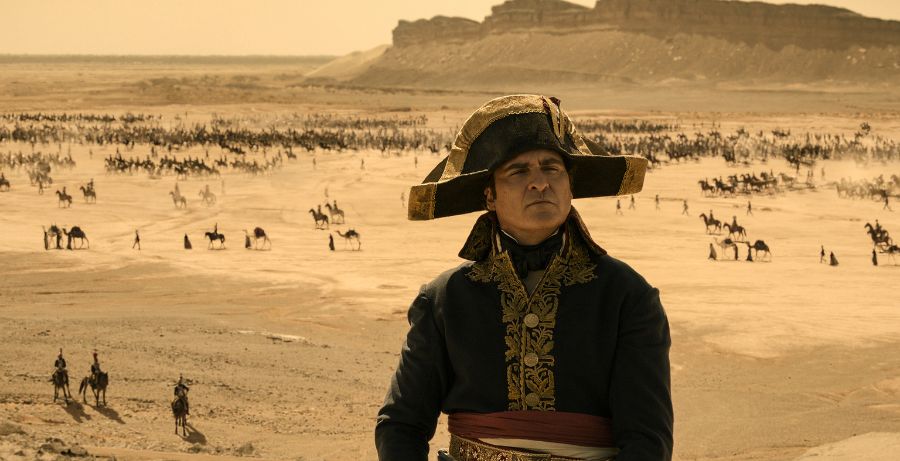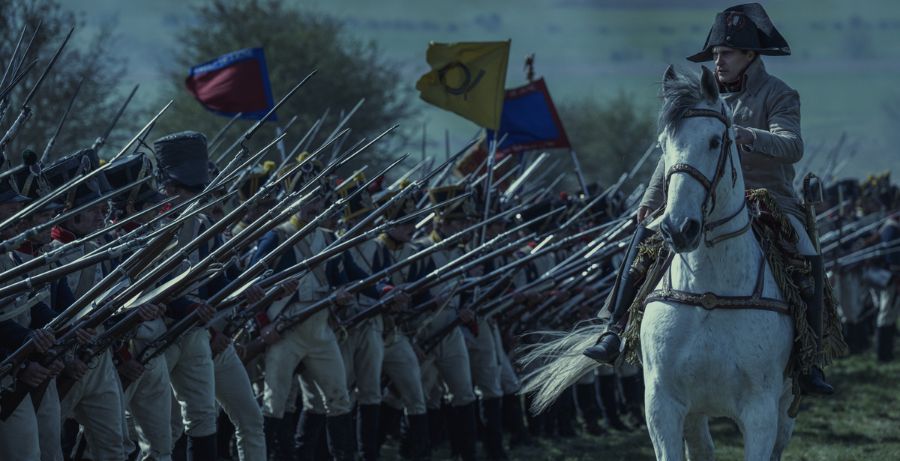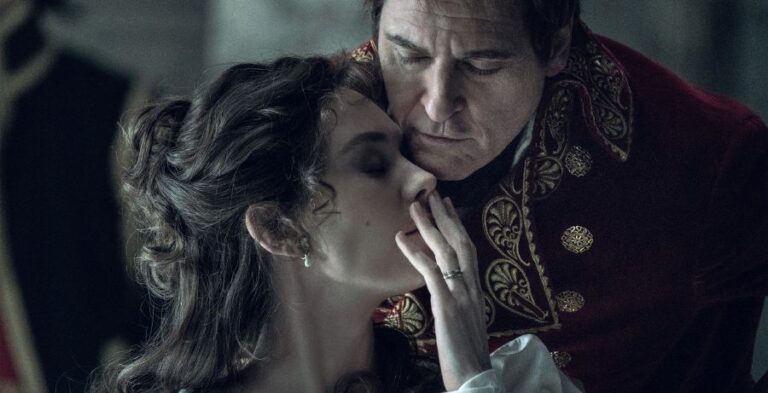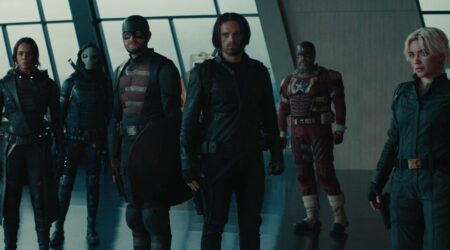Anyone expecting a definitive account of the world’s greatest military mind is in for a sore surprise. Ridley Scott’s aptly titled Napoleon is less an exploration of what made the misunderstood hero—or power-hungry tyrant—tick, and more a lavish excuse to recklessly throw everything at an immense canvas. The result is a film that’s epic, messy, hilarious, and ridiculously horny. While that makes for a thoroughly entertaining watch, it’s not hard to envision a stronger, more emotionally resonant portrait that’s been lost in all the madness.
At each turn, Scott’s take on the military maestro is trapped in an identity crisis, utterly grand and immaculate in one breath, and incredibly zany and confusing the next. Such a duality would work if the latter sequences didn’t feel like part of a completely different experience, lacking the same gravitas and ultimate catharsis. Napoleon manifests as two strong movies, haphazardly married into one.
Our story begins with Marie Antoinette meeting the Guillotine. A Corsican soldier by the name of Napoleon Bonaparte (Joaquin Phoenix) watches not with dismay but with faint excitement, at the opportunity the violent French Revolution affords him. From there, Scott tracks his rise from a Brigadier General after his victory at Toulon, to First Consul, to self-crowned Emperor, and then ultimately, exile. It’s a tale that has all the makings of a tense, all-encompassing epic. While Scott and screenwriter David Scarpa certainly attain that for great stretches, Napoleon plays more like an absurd, dry comedy rather than a stirring, dramatic retelling. Its humor does land at points, but it makes for an experience that has little in the way of dramatic or thematic heft.
The salacious, power-shifting relationship between Napoleon and his eventual Empress, Joséphine (Vanessa Kirby), underpins the narrative. But their dynamic unfolds like a campy, erotic romance that, while impeccably acted, renders moments light and superfluous that should be incredibly heavy and heartfelt. It makes for a jarring watch, one that consistently fails to correlate with the somber, humbling majesty of the film’s more grandiose moments.

Though armed with some wickedly funny one-liners, like “Destiny has brought me this lamb chop,” Napoleon often polishes a complicated, imposing figure into a buffoonish caricature—one whose status and station are not governed by calculated genius but by dumb luck. In Scott’s eyes, Napoleon is more a bumbling, comic hero than a complex legend, making light of everything that unfolds between each battle. It’s an interpretation that’s exciting in its own right but is at odds with the glazed-over and reserved Napoleon he conjures in the film’s more action-driven sequences. There’s a fascinating volatility in his gilded homelife that fails to transcend onto the battlefield.
It helps that these characters are brought to life by commanding performances from Phoenix and Kirby, a twosome that serves as the film’s beating heart. In Phoenix’s hands, the once-master of Europe is impossible to look away from, holding a world of cunning, idiocy, and perversity in his weathered visage. Though he delves headfirst into terribly silly territory, at points oafishly clamoring for sex or telling an English ambassador “You think you’re so great cause you have boats,” Phoenix plays it straight, making for a raucously funny turn even if it’s at odds with the more straight-laced, classical approach he takes in the film’s setpieces.
Kirby, despite playing a promiscuous, adulterous figure, lends Napoleon a rare grace and elegance. She superbly toes the line between avarice and tenderness, detestable one moment and utterly tragic the next. It’s a dynamic performance that pulls on our heartstrings while upping the film’s inherent oddity.

Where Napoleon does justice to its subject is in its grandeur and spectacle. Filmmakers like Scott are of a dying breed, capturing such immense scale with the most gritty and painterly of lenses. Skirmishes like Toulon and Austerlitz are mammoth-like in size but still pulsate with a raw, guttural immediacy. The veteran director proves unafraid to shock us with tantamount gore and viscera while still awing us with picturesque vistas.
The sonic-visual design reaches an apex in the decisive battle of Waterloo, which Scott turns into a grave game of chicken. We become immersed in a clash dictated only by the harshest of elements and the convictions of the generals staging it. It’s a climax teeming with a sense of catharsis and tension sorely lacking in the moments preceding it.
Yet, Napoleon’s technical feats can’t hide how disjointed its narrative feels. The epic doesn’t probe why Bonaparte was allowed to live after his defeat or the intricate politics that led to both his meteoric rise and fall. It’s a herculean task to tackle a figure as mythic as Napoleon, but Scott leaves too many glaring holes, hoping more interested, knowledgeable audiences will fill in the gaps themselves. Gaps that leave many important, supplementary figures like Paul Barras (Tahar Rahim), Caulaincourt (Ben Miles), and Arthur Wellesley (Rupert Everett) by the wayside. Scott’s purported four-hour cut (releasing on Apple TV+ at an undetermined date) may remedy these failings but with so much of Napoleon dedicated to odd and, at times, ludicrous vignettes, it’s hard to see the film resembling anything remotely close to a crucial portrait.
Napoleon feels less like an epic in the classical fashion and more like an exercise in big-budgeted camp. A quality its confusing assortment of British and American accents reinforces, as well as its generous approach to facts— at one point depicting Napoleon’s troops firing cannons at the Pyramids. It’s clear Scott is less interested in the accuracy of his epic than in the feelings it inspires. But there’s value in restraint and truth, in deconstructing a legend in an honest, nuanced manner.
Instead, we leave either admiring or detesting Bonaparte, rather than understanding him. It’s an unfortunate symptom of a film that gives us a different version of Napoleon at each turn. All of them are immensely captivating but don’t coalesce in a way that stays with us —unlike the man and the myth it seeks to capture.
Napoleon is streaming now on Apple TV+.
Napoleon
-
Rating - 6.5/106.5/10
TL;DR
Many elements of Napoleon are immensely captivating but don’t coalesce in a way that stays with us —unlike the man and the myth it seeks to capture.







